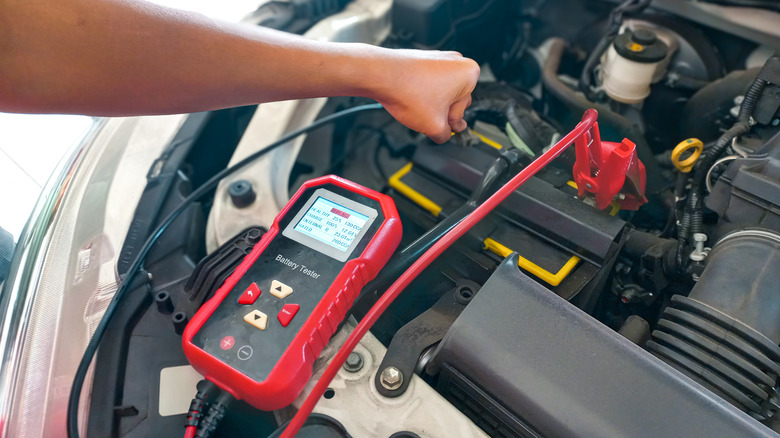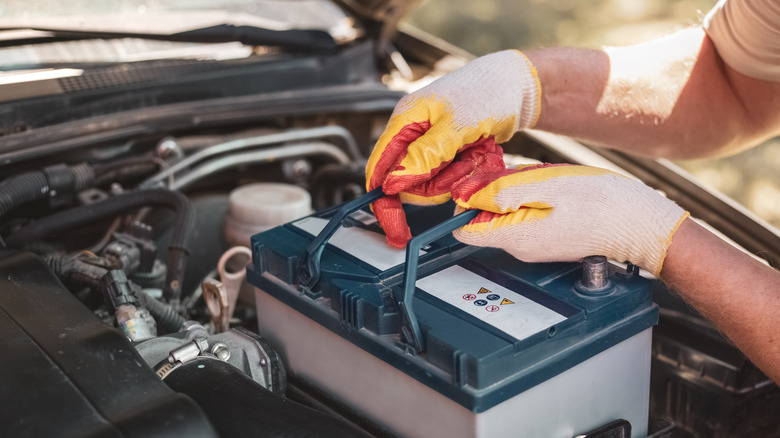How Much Voltage Should Your Alternator Have To Keep Your Car Battery From Dying?
Your car won't start for the second day in a row. You ask your neighbor for a jump (again) and head off to work — late, of course. You come to the conclusion that it has to be the battery or the alternator, but you're not sure which component is the culprit.
One of the fastest ways to determine the cause of your problems is to use a multimeter when looking at your car. A multimeter is a tool used to measure voltage, current, and resistance. When the car is running, the alternator should keep battery voltage between 13.5 and 14.5 volts to keep your car from dying. When your car is off, the voltage reading from the battery should be between 12.2 and 12.6 volts.
If the voltage while the car isn't running is below 12.2, the battery needs to be charged. If you charge the battery and the reading doesn't improve, your battery needs to be replaced. If the car can't keep battery voltage above 13.5 while running, the alternator isn't doing its job, leading to battery drain.
What if you don't have access to a multimeter? No worries. There's a ton of other clues that can help you identify the reasons your car battery keeps dying, and can help you determine whether you need a new battery, alternator, or something else entirely.
What do batteries and alternators do?
The main purpose of a car's battery is to provide spark to start the engine and power the electronic components in the car for a limited time. When the vehicle is running, the alternator provides power for the electronic components and recharges the battery. You should only need to charge your battery or jump your car if there was an obvious cause for battery drain — like leaving your headlights on.
However, all batteries are consumable parts, meaning they will eventually wear out and need to be replaced. A worn-out car battery isn't a disaster, since car batteries are readily available and easy for most people to replace on their own. However, if your battery is new or relatively new — and you've had to charge it or jump it multiple times — there's a good chance that your alternator is to blame.
There are several indicators that your alternator might be failing. A bad alternator may make a grinding sound that appears to be coming from the front of the car. The battery indicator light on the dashboard may also light up while the vehicle is running. Headlights or interior lights may pulse or flicker as well, almost like a candle.
You may notice other electrical issues, too. If you have power windows, they may be extremely slow to raise or lower, or even stop working altogether. The power steering may even quit unexpectedly. If the alternator fails completely, your car could die and likely won't start again until you get the alternator replaced.
Replacing a battery vs. replacing an alternator
Replacing a worn out car battery isn't particularly difficult. Once you have the right tools to change a car battery, it takes just a few minutes to get the job done. Many auto parts stores will remove and install your battery for you and recycle the old one. Whether you choose to do the replacement yourself or not, always check your owner's manual to confirm the battery's size and location.
Some vehicles, especially newer ones, place the battery in hard-to-reach locations, like under the back seat. If you have issues removing or finding the battery, it's always better to seek a local certified mechanic than to risk voiding your car's warranty or damaging the battery, which can lead to chemical exposure or environmental contamination. On average, replacement car batteries can cost anywhere from $185 to $450 depending on the battery type. It's not the worst car repair, but it's definitely not cheap.
Replacing an alternator is another project entirely, especially on newer vehicles where the alternator may be harder to find. Be sure to consult your owner's manual for specific details on your vehicle's alternator. Replacement alternators generally run around $100 to $350 for the part alone. There are lots of resources available online to guide you through replacing your own alternator. However, if you have any doubt, you can always turn to a trusted local mechanic.


